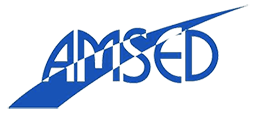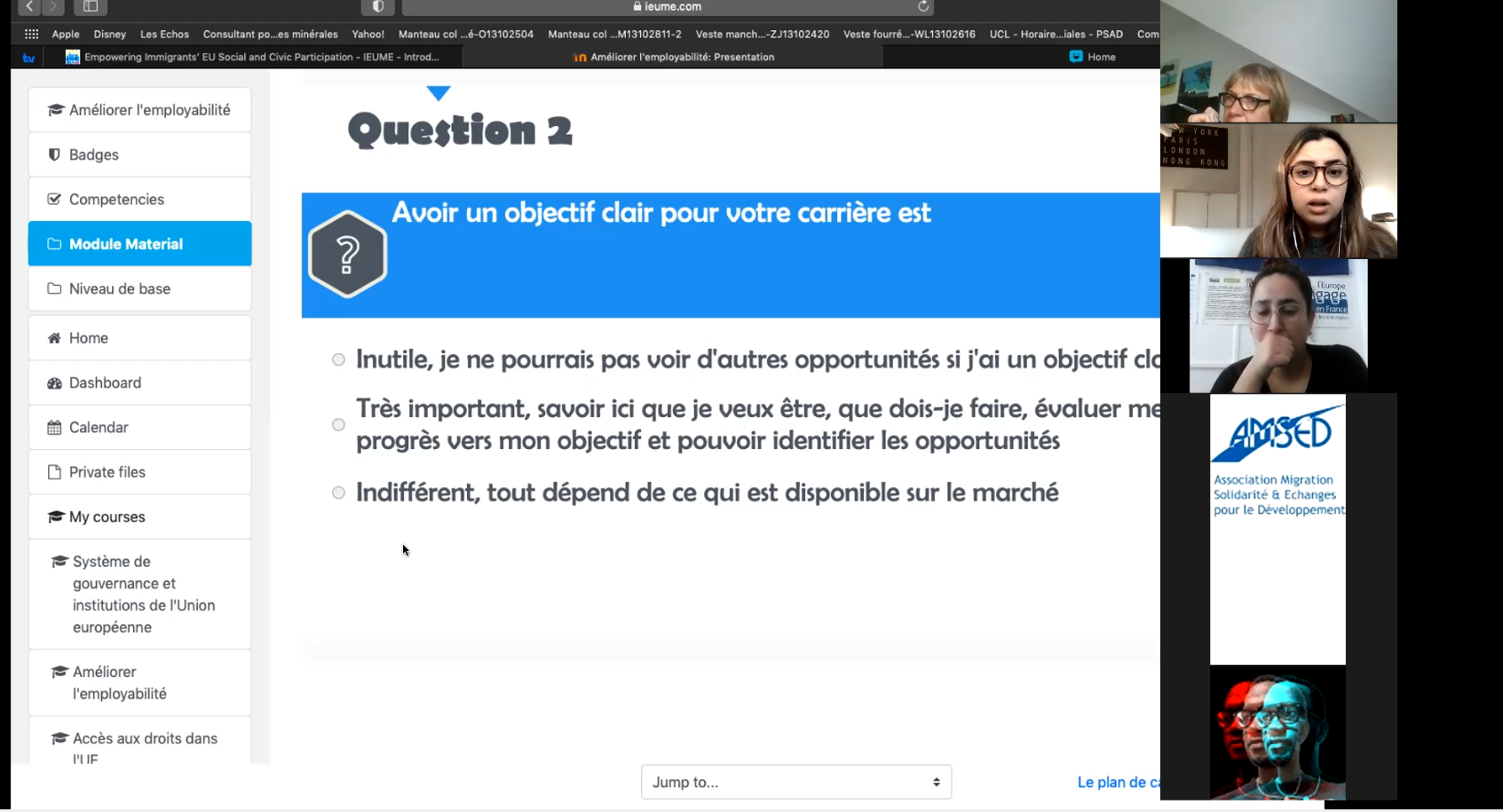The first multiplier event took place on Wednesday 21st April 2021, online targeting migrants and refugees associations, social work services, migrants’ support centers, associations, adult training providers, networks, local communities representatives, networks, public servants, academics, civil society organizations. Seminars goals were to familiarize these key stakeholders with the key aims and objectives of IEUME and to begin building the circle of influence and elicit support for project objectives, as potential promoters and multipliers. This first event reach together 8 local Stakeholders and 4 AMSED representatives.
The program of this first multiplier event was :
- First part: presentation of the digital platform https://www.ieume.com/fr/
- Second part: practical workshop “how to use of the digital platform by the participants” and possible remarks from Stakeholders.
Conclusion of the event: a second multiplier event will held on Friday, April 23, 2021, this time for the beneficiaries of the platform : refugees, economic migrants, asylum seekers. Other workshops for job seekers could be organized so that they can integrate the functioning of the platform (especially in case of language problems).
Part 1: Presentation of the digital platform
European project IEUME which created several outcomes, including a free online training platform for people with a migrant background (refugees, migrants, job seekers) on topics such as:
- employability,
- democratic principles,
- civic engagement,
- access to rights in the EU,
- systems of governance,
- European institutions
- European culture.
This is a project supported by Erasmus +.
This training is intended for people who work in daily contact with people of immigrant background in their socio-professional integration. Indeed, the employees and volunteers of the Amsed can represent a relay for the information and the diffusion of this platform.
The general idea is to disseminate the results of this project to professionals who accompany migrants. The aim of IEUME is to strengthen the civic and social participation of migrants in the European Union through innovative educational media. This project was born two years ago with the European context (20 million third-country nationals living in the EU and representing 4% of the total population). Despite the efforts made, these third-country nationals continue to face both professional and social obstacles in their integration. The general objective of the project is therefore to contribute to a further integration of migrants, refugees and asylum seekers, i.e. all people from a third country outside the EU, in order to create a toolbox to facilitate it.
There are several partners in the project:
- France
- Malta
- Cyprus
- Germany
- Various NGOs and local associations
Thus, several intellectual productions have been produced thanks to this project:
- E-booklet: an online book that includes a study of statistics on the integration of migrants. This e-book lists the training courses that exist at the European level by country (for example, what training courses are available in France? in Portugal? etc.), and groups together national reports on integration policies. These are supports that can help in the accompaniment.
- Study program
- Digital platform and application on smartphone (which is the subject of this meeting). This platform has been gamified, i.e. it is a digital platform based on games. The application is downloadable on all smartphones (of the same type as Duolingo)
- IEUME tools for assessment, validation and recognition of skills. As a result of the different study programs followed by the participants, tools for validation and recognition of competences at the European level will be put in place.
- Adaptation and Policy Kit
The different trainings are 5 in number and were based on :
- The EU and the governance system
- Employability
- Access to rights
- Culture
- Key principles of democracy and civic engagement
Once on the e-learning platform, you can choose your language and 5 tabs appear, i.e. the 5 training themes. At first sight, the objectives and expected results of the module appear. The general summary of the model also appears. We can see if it is the equivalent of validation credits, which can be interesting for the migrants’ CVs. The idea is that it is an interactive platform, and to study everything on a theme and then to make games and quizzes to see if the participants have understood and integrated everything. Not all languages are available on the platform because the main goal is that the participant learns via the language of his host country. The modules are sometimes visual to overcome the language problem. The more the participants progress in the games, the more the level increases and requires a basic knowledge of the language of the host country because the objective is above all to improve the integration of the participants, which requires learning the language. For those who are not computer literate, a smartphone application is available. There is also a user guide to know how to use it. To access the platform, you have to register via your email or via Facebook, Gmail for example. It is quite fast and intuitive.
Second part: Workshop on “how to use of the platform” and remarks
The participants of the multiplier event were divided into two sub-groups to see how to register, test the tool and choose a theme that interests them to get feedback from integration professionals.
For some, the site is well done but the site is not popularized enough for the FLE public. It could be good to start with the quiz and then have the person accompanying the refugee do the explanations, so that the beneficiary is not lost. The language should be simplified, but it is a very interesting tool to use in a group with a facilitator who explains and several refugees.
It is a very interesting support that deserves to be tested with the migrant public.


